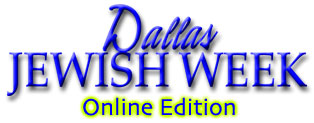| Dallas Jewish Week Menu
|
 |
Community mourns and remembers as one
Dallas Jews observe anniversary of terror attacks on U.S.
by Deborah Silverthorn
Special to DJW
A year after the Sept. 11 terrorist attacks on the U.S., more than more than 1,000 Dallas-area Jews commemorated the tragedy with stirring words and music in the sanctuary of Temple Emanu-El.
"This was an evening where we felt that all of the community could, and should, come out and express our feelings of solidarity with America," said Marlene Gorin, director of the Jewish Community Relations Council (JCRC). "I think that the connection was very important, and everyone wanted and needed somewhere to share their grief."
Speakers included religious leaders from most of the sponsoring organizations: JCRC, Adat Chaverim, Congregation Anshai Torah, Congregation Beth Torah, Congregation Kol Ami, Congregation Ner Tamid, Congregation Shaare Tefilla, Congregation Shearith Israel, Congregation Tiferet Israel, Temple Emanu-El, Temple Shalom and the Rabbinic Association of Greater Dallas.
The evening began with the colors of the flags, Israeli and American, being presented by the Jewish War Veterans Color Guard followed by the "Star Spangled Banner" and "Hatikvah." Rabbi Stefan Weinberg of Congregation Anshai Torah welcomed everyone and introduced Cary Rudberg who blew the shofar, with amazing intensity, as the call to worship.
"How did the past year go by so fast? In the last year, we've each called upon God, each other, and anyone who would heed our call for compassion," said Weinberg. "Jews often seek each other out and support each other in times of need and with God's guidance, we've returned together. Together we'll never forget those who died and we are forever committed to making a kinder and better world for our children."
"How did the past year go by so fast? In the last year, we've each called upon God, each other, and anyone who would heed our call for compassion," said Weinberg. "Jews often seek each other out and support each other in times of need and with God's guidance, we've returned together. Together we'll never forget those who died and we are forever committed to making a kinder and better world for our children."
Larry Ginsburg, chair of the JCRC, and James Hogue, president of the Jewish Federation of Greater Dallas, lit two tall white candles, one slightly shorter than the other, to signify hope and the memory of the two buildings destroyed. Cantor Don Croll of Temple Shalom led the audience in "Oseh Shalom" and also sang "Golden Dream," a song that speaks of America's new frontiers and spreading our wings. Cantor Itzchak Zhrebker, of Congregation Shearith Israel, led "Ani Ma-Amim," "Sim Shalom" and offered the "El Moleh Rachamim," the prayer Jews traditional say to honor those who have died.
Rabbi Heidi Coretz, of Congregation Ner Tamid, led a prayer of comfort. "New York and Washington, shining cities, diminished like Jerusalem after the destruction of our Temple, need your comfort and our aid," read Coretz. "Help us to maintain our courage and our efforts to support our people. Strengthen the hands of those who defend this country, and those who try to maintain peace against these attacks."
The congregation was led by Rabbi Jordan Parr, of Adat Chaverim, in the Hebrew and English reading of Psalm 23. "The Lord is my shepherd; I shall not want É Surely goodness and loving kindness shall follow me all the days of my life; and I will dwell in the house of the Lord forever," the audience read, with many dabbing tears from their faces.
Mike Zucker, president of Congregation Shaare Tefilla, led a responsive reading of "A Vision of World Peace" which prays that "violence shall no more be heard in your land, neither desolation nor destruction within your borders."
Temple Emanu-el's Rabbi David Stern told the congregation that at Yom Kippur, Jews ask God "zochrainu l'chaim É remember us onto life." "The "l" sound made by the letter "lamed" in "l'chaim" is a preposition that we use because Jews don't just remember people or occasions but we remember them 'toward' something," said Stern. "Even in death, we remember toward life. The Jewish question isn't will be remember those who died, but how will we remember them."
"Sept. 11 will always fall around the Jewish season of reflection and repentance, and we will always be reminded to value each moment and each soul that comes our way. Rebuilding must take place in every city, every family and in every human heart."
Rabbi David Lyon, of Temple Shalom, reflected on the memory and stories of many of the victims who died. Jan Maciejewski, 37,a computer consultant and waiter at the Windows on the World restaurant. Michael LaForte, 39, a vice president at Cantor Fitzgerald. Andrea Lyn Haberman, 25, at a business meeting during her first visit to New York City. Each of these people and thousands more were newly engaged, awaiting the arrivals of babies, in love É good, kind people.
Rabbi Murray Berger, president of the Rabbinic Association of Greater Dallas, led the mourner's Kaddish and the responsive reading "We Remember Them." "At the rising of the sun and its going down, we remember them. At the blowing of the wind and in the chill of winter, we remember them. At the opening of the buds and in the rebirth of spring, we remember them É."
"We Jews are a people of hope," said Rabbi William Gershon of Congregation Shearith Israel. "Hatikvah means 'hope' and for the Jew, there is always hope. Throughout history, even when we've had no reason to hope, we always have. The mishnah teaches that when there's destruction, we must build, and that is a lesson we must all share with America. Our vision of redemption is our gift to America, humanity and to all those who mourn and grieve."
This story was published in the DallasJewishWeek
on: Thursday, September 19, 2002
Copyright 2001, Dallas Jewish Week